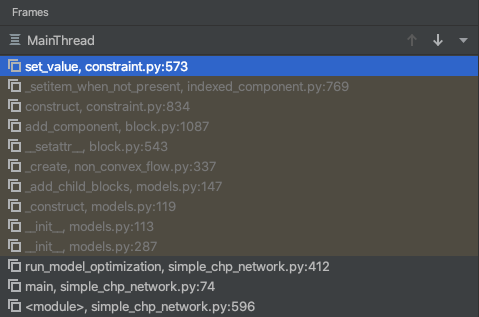Hello openmod community,
And a happy new year to everybody. I am currently working on an excel-reader to create an energy system. But it seems I am lacking understanding of how OEMOF handles nonconvex flows of a transformer component to build a MILP-problem model. Maybe someone can give me a hint how to fix my issue.
My Problem:
My script automatically reads in an excel file with components data. The script is based on the excel reader example from the example collection and is working without an error for LP-Problems.
But as I start to assign startup_costs to a transformer component in my excel file OEMOF fails to initialize the model later on. There is no error during creation of the components or while setting up the energy system. But once I try to initialize the model there is an error (see below). I feel like I am missing out on how to correctly add a nonconvex flow to my transformer component. Just to mention: the script throws no error when I assign a nonconvex flow to a source component. It seems to be specific to the transformer component.
My script & data:
transformers sheet of node_configuration.xlsx:
| label | active | inputs | outputs | conversion_factors | inputs.nominal_value | inputs.max | inputs.min | inputs.fixed | inputs.variable_costs | inputs.startup_costs | inputs.activity_costs | outputs.max | outputs.min | outputs.fixed | outputs.variable_costs |
|---|---|---|---|---|---|---|---|---|---|---|---|---|---|---|---|
| gas_boiler | 1 | b_gas | b_heat | 0,9 | 300 | 100 | 1000 |
relevant section of python script:
from oemof import solph
import os
from math import isnan
import pandas as pd
def main():
xls = pd.ExcelFile("input/node_configuration.xlsx")
nodes_data = {x: xls.parse(x) for x in xls.sheet_names}
my_nodes = create_nodes(nd=nodes_data) #creates a list of all nodes
run_model_optimization(nodes=my_nodes) #initializes and solves the model
def create_nodes(nd=None):
nodes = []
busd = {}
#list of nonconvex-flow variables to filter parameters
nonconv_flow_var = ["activity_costs", "startup_costs"]
#list of linear flow parameters for filtering
flow_var = ["nominal_value", "max", "min", "fixed", "variable_costs"]
#list of solph node parameters
node_var = ["conversion_factors"]
#create bus components from 'buses' table
for i, b in nd["buses"].iterrows():
if b["active"]:
bus = solph.Bus(label=b["label"])
nodes.append(bus)
busd[b["label"]] = bus
#create transformer components from 'transformers' table
for label in nd["transformers"][(nd["transformers"]["active"] == 1)]["label"].unique():
t = nd["transformers"][(nd["transformers"]["label"] == label) & (nd["transformers"]["active"] == 1)]
#set up dict for static node variables
i_args = {}
o_args = {}
conversion_args = {}
node_args = {"label": label}
for io in ["inputs", "outputs"]:
for bus_label in t[io].unique():
t2 = t[t[io] == bus_label].max(axis=0) #reduces df to one row with max value if there are multiple rows with same bus label
# set static flow values
flow_args = {x.split(".")[-1]: t2[x] for x in t2.index.values if x.split(".")[-1] in flow_var and (x.split(".")[0] == io) and not isnan(t2[x])} # kwargs for flow & filter out all NaN values
nonconvex_flow_args = {x.split(".")[-1]: t2[x] for x in t2.index.values if x.split(".")[-1] in nonconv_flow_var and (x.split(".")[0] == io) and not isnan(t2[x])} # kwargs for nonconvex flow & filter out all NaN values
# add nonconvex flow obj. to flow kwargs
if len(nonconvex_flow_args) > 0:
flow_args["nonconvex"] = solph.NonConvex(
**nonconvex_flow_args) # construct nonconvex obj in kwargs for flow
if io == "inputs":
i_args[busd[bus_label]] = solph.Flow(**flow_args)
if io == "outputs":
o_args[busd[bus_label]] = solph.Flow(**flow_args)
conversion_args[busd[bus_label]] = t2["conversion_factors"]
# add flow obj to node kwargs
node_args["inputs"] = i_args
node_args["outputs"] = o_args
node_args["conversion_factors"] = conversion_args
# create component
nodes.append(solph.Transformer(**node_args))
return nodes
def run_model_optimization(nodes=None):
solver = "cbc"
date_time_index = pd.date_range(start='1/1/2018', end='1/08/2018', freq="H")
energysystem = solph.EnergySystem(timeindex=date_time_index)
# adding nodes to the energy system
energysystem.add(*nodes)
model = solph.Model(energysystem) # <-- this is where the error occurs
model.solve(solver=solver, solve_kwargs={"tee": True})
...
I think there must be something going wrong in the create_nodes() function. I designed it as such, that there is a nested collection and unpacking of relevant parameters in dictionaries with the **-operator. So at first a parameterized nonconvex flow is beeing put into the flow_args-dictionary before a flow object can be created. After that the relevant input/output flow is being used in a dictionary to create the transformer object with all additional component parameters in the node_args-dictionary.
Error message:
11:22:59-WARNING-DEPRECATED: Chained inequalities are deprecated. Use the inequality()
function to express ranged inequality expressions.
(called from /.../venv/lib/python3.9/site-packages/oemof/solph/blocks/non_convex_flow.py:330)
ERROR: Rule failed when generating expression for constraint NonConvexFlow.min
with index ("<oemof.solph.network.bus.Bus: 'b_gas'>",
"<oemof.solph.network.transformer.Transformer: 'gas_boiler'>", 0):
ValueError: Constraint 'NonConvexFlow.min[b_gas,gas_boiler,0]' does not
have a proper value. Found 'True' Expecting a tuple or equation. Examples:
sum(model.costs) == model.income (0, model.price[item], 50)
There seems to be a problem with the nonconvex flow but I don’t understand the error message. The debugger suggests the error occurs while constructing the BaseModel at the function call of _add_child_blocks().

Am I not aware of something in the routine of component creation? Is there something obviously wrong in my code?
However the documentation of the Flow class explains there is a significant change of the model if a NonConvexFlow object is added here. I wonder if this conflicts with my nested initialization of a MILP problem.
Any help is appreciated.
Best regards
Till
